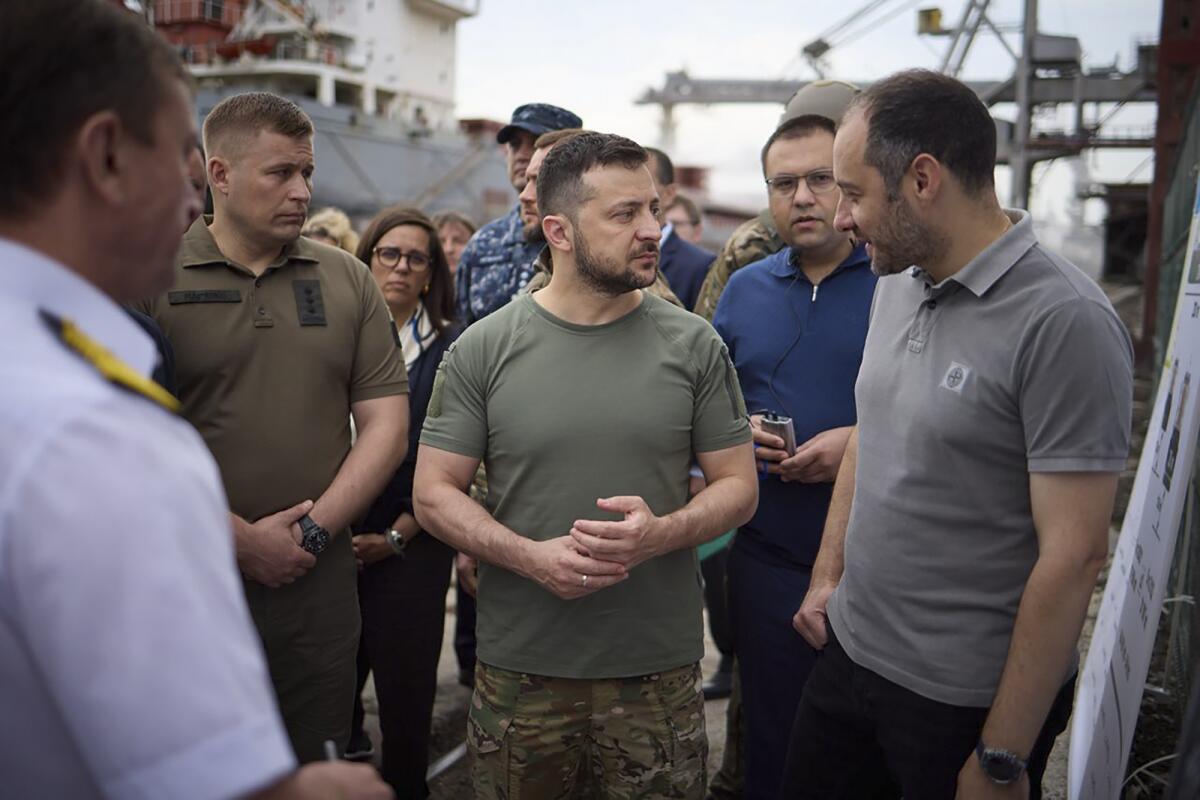Zelensky visits port as Ukraine prepares to ship out grain

- Share via
ODESA, Ukraine — Ukrainian President Volodymyr Zelensky visited a Black Sea port Friday to watch crews prepare to export grain trapped by Russia’s war, a week after a deal was struck to allow critical food supplies to flow to millions of impoverished people worldwide.
“The first vessel, the first ship, is being loaded since the beginning of the war,” Zelensky told reporters as he stood next to a Turkish-flagged ship at the Chernomorsk port in the Odesa region of Ukraine.
He said the departure of wheat and other grain will begin with ships that were loaded but could not leave Ukrainian ports after Russia invaded in late February.
Ukraine is a key global exporter of wheat, barley, corn and sunflower oil. The disruption to those exports has raised global food prices, threatened political instability and helped push more people into poverty in vulnerable countries.
Ukraine’s military is committed to the ships’ safety, said Zelensky.
“It is important for us that Ukraine remains the guarantor of global food security,” he noted.
His unannounced visit to the port is part of Ukraine’s push to show the world that it is nearly ready to export millions of tons of grain under last week’s breakthrough agreements, which were brokered by Turkey and the United Nations and signed separately by Ukraine and Russia. The sides agreed to facilitate the shipment of grain from three Ukrainian ports, as well as fertilizer and food from Russia, through safe corridors on the Black Sea.
But a Russian missile strike on Odesa hours after the deal was reached threw Moscow’s commitment into question and raised concerns about the safety of shipping crews, who already have to navigate waters strewn with mines.
Russia’s deputy U.N. ambassador, Dmitry Polyansky, told the U.N. Security Council on Friday that Ukraine has been deploying military goods in the port of Odesa, “and we will continue to destroy these goods and objects, as we did on July 23.”
Kremlin spokesman Dmitry Peskov emphasized the “link between taking grain out of Ukrainian ports and unblocking direct or indirect restrictions on the export of our grain, fertilizers and other goods to global markets.”
The security concerns and other complexities have set the agreement off to a slow, cautious start. The clock is ticking: The deal is good for 120 days.
The goal over the next four months is to export 20 million tons of grain from three Ukrainian seaports that have been blocked since the Feb. 24 invasion. That provides time for four to five bulk carriers per day to transport grain from the ports to people in Africa, the Middle East and Asia who are facing food shortages and, in some cases, famine.
Getting the grain out is also critical to farmers in Ukraine, who are running out of storage capacity because of a new harvest.
“We are ready,” Ukraine Minister of Infrastructure Oleksandr Kubrakov told reporters Friday at the port of Odesa, but he said Ukraine is waiting on the U.N. to confirm the safe corridors ships will use. In the meantime, a ship at Chernomorsk was being loaded with grain, he said.
Lloyd’s List, a global shipping news publisher, noted that while U.N. officials are pushing for the initial voyage this week in order to show progress, uncertainty on key details will likely prevent the immediate ramping-up of shipments.
“Until those logistical issues and detailed outlines of safeguarding procedures are disseminated, charters will not be agreed, and insurers will not be underwriting shipments,” wrote Bridget Diakun and Richard Meade of Lloyd’s List.
They note, however, that U.N. agencies, such as the World Food Program, have already arranged to charter much of the grain for urgent humanitarian needs.
Shipping companies have not rushed in because explosive mines are drifting in the waters, ship owners are assessing the risks, and many question how the agreement will unfold.
The deal stipulates that Russia and Ukraine provide “maximum assurances” for ships that brave the journey to the Ukrainian ports of Odesa, Chernomorsk and Yuzhny.
Smaller Ukrainian pilot boats will guide the vessels through approved corridors. The operation will be overseen by a joint coordination center in Istanbul, staffed by officials from Ukraine, Russia, Turkey and the U.N.
Once ships reach port, they will be loaded with grain before departing back to the Bosporus strait, where they will be inspected for weapons. There will likely be inspections for ships embarking to Ukraine as well.
Associated Press writers Aya Batrawy in Dubai, Suzan Fraser in Ankara, Turkey, and Edith M. Lederer at the U.N. contributed to this report.
More to Read
Sign up for Essential California
The most important California stories and recommendations in your inbox every morning.
You may occasionally receive promotional content from the Los Angeles Times.










